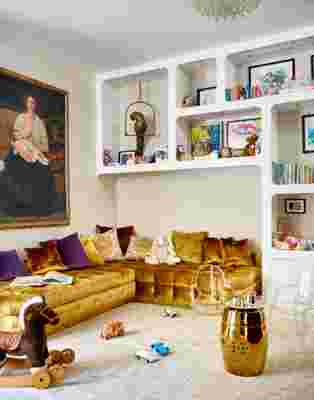“My immediate reaction was, Who is this crazy person chasing me down Santa Monica Boulevard, yelling at me from his car window?” recalls Lenny Kravitz of the moment he noticed Branden Williams in hot pursuit. Little did the rock star and interior designer extraordinaire know that this run-in with Williams was the beginning of a flourishing design partnership. Before that fateful encounter, Williams, a luxury real estate broker, had been searching for a designer for his dream home, purchased with his wife and business partner, Rayni. Located in the historic Trousdale Estates neighborhood of Beverly Hills—once the stomping ground of Frank Sinatra, Elvis Presley, and Groucho Marx—the Williamses’ new house was designed by iconic midcentury architect Jack Charney.

In the open-plan kitchen and dining area, a custom hand-blown amber-glass light fixture hangs above a 1950s handcrafted table from Paris and an antique Oushak rug. The kitchen appliances are by Gaggenau, the refrigerators are by Sub-Zero, and the floors throughout are Italian travertine. The china on display in the kitchen cabinets is by Hermès and Roberto Cavalli.
“We wanted the house to be an homage to Trousdale’s midcentury heyday but more over-the-top and funky, without any rules,” notes Williams. “Think Slim Aarons meets Casino. ” In spite of meeting several top designers, he was unable to find a fit, until one night he stumbled across Kravitz Design’s website. “I stayed up for four hours looking at the site, until 3 a and thought, Oh, my God, this is our designer. ”
Fortuitously, Williams spied Kravitz on the road the next day and decided to seize the moment, making an illegal U-turn, speeding up beside the rock legend and delivering his pitch. As soon as Williams established he was not a “crazy stalker fan,” the two realized they shared a common vision. According to Kravitz, “My design aesthetic can go in many different directions depending on the client and the project, but where Branden and I align is in the extravagant and bold expression of 1970s Los Angeles glamour.” Williams recalls, “We were worried, like, we’re hiring a rock star to do our interior design, how are we going to afford this? But Lenny was really nice and said I want to work with you on this, if you really want to do it and don’t hold back, I’m on board.”

A custom built-in gold velvet sofa creates a bold focal point in the kids’ den, which also includes handcrafted 1960s-style bookshelves and a table and chairs by Kartell. The vintage oil painting was a gift from actors Jeremy Renner and Kristoffer Winters, who found the work while shooting a movie in Argentina.
Tearing down the house after the discovery of asbestos, the couple rebuilt following Charney’s exact architectural footprint, with only slight modifications (higher ceilings, for example) and a 1,000-square-foot extension to accommodate their growing family. Williams and Kravitz Design collaborated closely to bring their decadent vision to life, detail by painstaking detail. Against a bright backdrop of yellows, oranges, stones, and metallics, lush velvets and shags live alongside graphic patterns, from tiger stripes to 1920s chinoiserie. To find the perfect stone for the dramatic shower, one of Kravitz’s favorite features, they scoured stone yards for two years until they found the right one—a stunning purple onyx. “That’s where my patience would run out,” says Rayni, laughing. “Branden would go and find stones and I’d be like, ‘Great we’ve got it,’ and he’d sit with it and be like, ‘No, it’s not the right one.’ He was all about perfection.”

The ultimate resource for design industry professionals, brought to you by the editors of Architectural Digest
“This is your dream home, you have to take your time,” replies Williams, who took the same perfectionist approach to all aspects of the home, layering on ever more showstopping pieces, from a 26-foot wraparound couch to a pair of giant resin tusks to a Playboy -inspired pink clamshell bed. Williams and Kravitz relished the layering, always in search of the perfect new addition, whether it was a jade toilet from China or a 300-pound bronze tiger’s head from the late Hugh Hefner’s estate. Yet they always kept the spirit of midcentury design in mind.
“Now when people visit us, they don’t realize our home is new; they think it’s a beautiful restoration,” says Rayni. “If Jack Charney ever visits us in spirit form, I’m pretty sure he’d say, ‘Wow, my house stood up so well.’”
